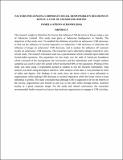| dc.description.abstract | This research sought to determine the factors that influence CSR decisions in Kenya using a case of Safaricom Limited. This study took place at Safaricom headquarters in Nairobi. The objectives of this study were: To establish the influence of profits on safaricoms’ CSR decisions, to find out the influence of societal imperative on safaricoms’ CSR decisions, to determine the influence of image on safaricoms’ CSR decisions, and to explore the influence off customer loyalty on safaricoms’ CSR decisions. The researcher used a descriptive design research to carry out the study. The research instrument used was a questionnaire which contained open-ended and closed-ended questions. The population for this study was the staff of safaricom foundation which consisted of the management, the Governance and the subordinate staff. Simple random sampling was used to select the sample which represented 68% of the population. Piloting of this study was done using 5 respondents picked at random to test the research instruments. Data analysis was done using descriptive statistics. After analysis of the data, it was presented in form of tables and figures. The findings of the study show the factor which is most influential to organizations when making CSR decisions is societal imperative while the factor which is least influential is profits. The study concluded that although CSR is supposed to be for the benefit of the society, organizations also benefit in one way or the other either through profits, customer loyalty or a good corporate image. For the study and related conclusions, the researcher recommended further research on factors that motivate organizations to engage in CSR activities. | en_US |

